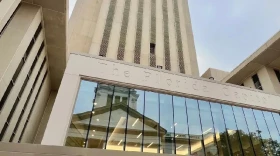Japan's newly confirmed Prime Minister Yasuo Fukada has quickly made it clear that his ruling Liberal Democratic Party is facing a crisis of public trust unprecedented in more than a half century in power.
As expected, Fukuda won confirmation comfortably in the lower house of Parliament, which the LDP controls; however, the upper house, chose opposition leader Ichiro.
In such case, Japan's constitution defers to the lower house, but the outcome suggests Fukuda will have a tough time getting legislation through the split Parliament.
Fukuda restated his determination to restore public trust in the LDP, shaken by a series of scandals and policy blunders during the short tenure of former Prime Minister Shinzo Abe. Fukuda acknowledged to reporters that he has no room for mistakes.
"I would say that I named my new Cabinet as if I were fighting with my back to the wall," he said. "If I make even one mistake, the LDP could be lost. We must remain vigilant."
Former Deputy Chief Cabinet Secretary Kosei Ueno once served alongside Fukuda. He said the LDP needs to hold lower house elections to renew the party's popular mandate, especially after its crushing defeat in July's upper house elections.
"If the LDP runs into difficulty getting legislation passed, we may need to ask the people again which party they support," he said.
Ueno was among the LDP legislators who lost his seat in July. He said one reason for the LDP's defeat was dissatisfaction with the economic reforms begun under Abe's predecessor, Junichiro Koizumi.
"The reforms had a good effect on the whole … but … there were some side effects," he said. "So we may need to slow down or adjust our reforms."
Fukuda's first move in office was to name a new Cabinet, composed largely of LDP faction bosses and ministers from Abe's administration.
After Abe's blunders, many Japanese were relieved that an experienced and capable prime minister is now at the helm. However, a return to the LDP's habitual back-room dealing and factional haggling can hardly be comforting.
Copyright 2023 NPR. To see more, visit https://www.npr.org.




